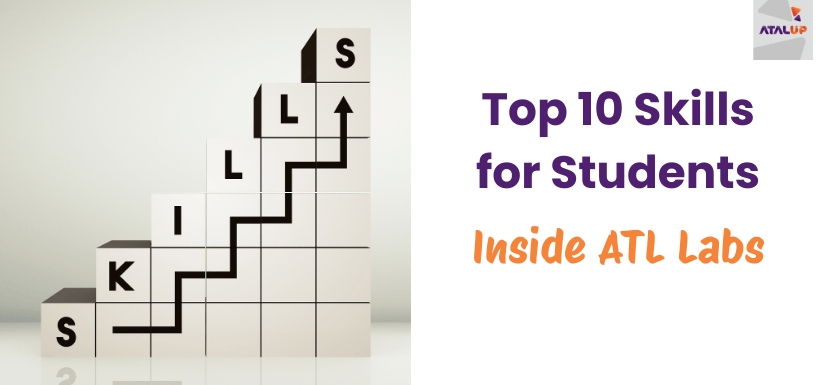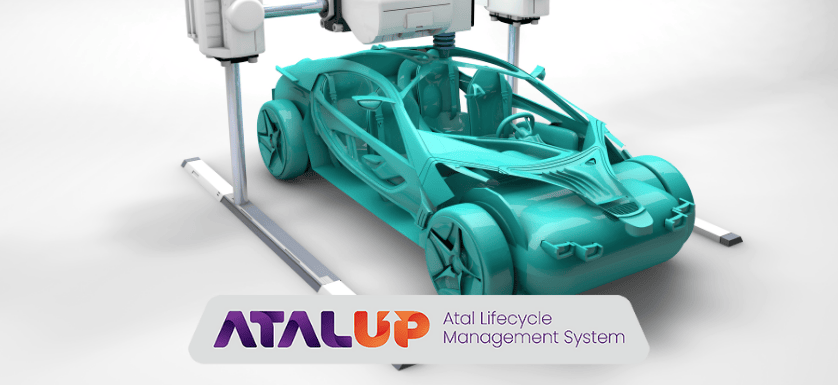
Schools and colleges follow theory-heavy curriculum limiting students’ learning. Most of the students who score well in exams understand the concepts but have no hands-on knowledge.
Right after school when students face the real-world challenges through college projects or internships, the theoretical experience barely plays any important role. In this blog, I have tried to share top 10 skills for students that will help them in their practical job journey. In my career of 27+ years, I have helped many interns upscale their skills and grab excellent opportunities and that’s why I decided to write a blog to help more and more kids.
Atal Tinkering Lab; an initiative started by Atal Innovation Mission and NITI Aayog is building and ecosystem that focuses on 21st-century ‘learning skills for students.’ So, let’s get started.
Why Traditional Learning Isn’t Enough
Let’s face it, there’s a massive gap between what students learn in classrooms and what the real world expects from them. And this isn’t just a hunch. It’s backed by data.
Take PISA (Programme for International Student Assessment) for instance. Every three years, it tests 15-year-olds across the globe, not on rote memory, but on how well they can apply their knowledge in real-life situations. When India participated back in 2009, we sent our brightest students from top schools in Tamil Nadu and Himachal Pradesh. The result? India ranked 72 out of 73 countries. The reason? A system deeply rooted in theory, not application.
Fast forward to today, things are changing. NCERT’s PARAKH is training teachers nationwide on how to frame better, more application-driven questions. This aligns with the National Education Policy (NEP), which pushes for holistic learning over mugging up.
The goal is clear: by 2026, schools across India will switch to application-based learning. And ATL Labs are already a step ahead in making that happen.
Top 10 Skills for Students to Thrive in the Future
1. Critical Thinking & Problem Solving
In a world overloaded with information, the ability to think clearly and critically is gold. Students must learn to ask the right questions, analyze patterns, and solve problems without spoon-feeding. ATL Labs encourage this mindset through challenges like building prototypes or solving community issues using technology. When a student attempts to design a water-level detector or an energy-saving device, they aren’t just tinkering, they’re thinking critically and solving real problems.
2. Design Thinking & Innovation
Design thinking is no longer just a corporate buzzword, it’s how the next generation will approach every problem. ATL Labs actively promote design thinking through activities where students go from empathy to ideation, then build and test. Whether it’s creating a Braille-based reading tool or a low-cost irrigation system, students learn that innovation begins with understanding human needs.
3. Coding & Computational Thinking
Coding is today’s second language. It teaches logic, pattern recognition, and algorithmic thinking. ATL Labs give students hands-on access to block-based coding tools, microcontrollers like Arduino and Raspberry Pi, and platforms like Scratch or Python. When a student writes a code to automate a smart home prototype, they’re not just learning syntax, they’re thinking like future engineers.
4. AI & Machine Learning Basics
AI is transforming every industry, and early exposure is key. ATL Labs have started incorporating AI-based modules that teach students the basics, image recognition, voice commands, and even simple machine learning algorithms. A student might train a basic AI model to sort recyclable waste. That’s not future learning, it’s future-building.
5. 3D Design & Rapid Prototyping
Why just draw ideas when you can print them? Using 3D printers available in ATL Labs, students can convert digital designs into physical models. Whether it’s designing a prosthetic hand or a model of a sustainable house, they learn to iterate, test, and refine, key traits of tomorrow’s designers and architects.

6. Electronics & IoT Fundamentals
Understanding circuits, sensors, and IoT components builds a foundation for tech innovation. ATL Labs expose students to breadboards, sensors, and real-world IoT kits. When students build devices like a temperature alarm system or smart attendance tools, they see how software and hardware interact in real life.
7. Robotics & Automation
Robotics brings multiple skills together, mechanical thinking, coding, and creativity. ATL Labs let students explore automation through kits that help them build robots to follow lines, avoid obstacles, or even detect gas leaks. These activities prepare them for future roles in industrial automation, defense, and even space tech.
8. Intellectual Property & Entrepreneurship
The next-gen inventor also needs to know how to protect and pitch their idea. Through ATL innovation challenges and marathons, students are guided on how to document their ideas, apply for basic IP, and even present them to panels. This exposure builds confidence and plants early seeds of entrepreneurship. Application-based learning is the base of future entrepreneurship.
9. Collaboration & Teamwork
Innovation isn’t a solo sport. ATL projects demand that students work in teams; assigning roles, managing deadlines, resolving conflicts, and achieving shared goals. This builds emotional intelligence and prepares them for collaborative work environments, whether it’s in startups or research labs.
10. Resilience & Growth Mindset
Failures are inevitable, especially in a lab environment. What matters is the ability to bounce back. ATL Labs create a safe space for failure. If a robot doesn’t move, or a circuit doesn’t work, students learn to debug, restart, and try again. That’s resilience in action, and it’s priceless.
How ATL Labs Help Build These Learning Skills for Students
Hope you understood how these top 10 skills for students can change the future of India. Hence, Indian government has alerady established a systematic approach that will lead Indian students achieve success on a global level in the coming future.
Atal Tinkering Labs (ATL) under the guidance of Atal Innovation Mission (AIM) & NITI Aayog is enrolling application-based learning in India. By 2024, AIM has established 10,000 ATLs all over India. The government has announced 50,000 more ATLs from 2025.
The aim is to encourage application-based learning in India and form future innovators and entrepreneurs. Students of Skkim developed a robotic accident prevention system built for hilly region, showcasing the application of STEM to real regional issues.
ATL vendors train the teachers and help them conduct innovative activities in ATL labs. Students get to explore the world of hands-on learning through step-by-step and easy processes.
How ATALUP Can Help
ATALUP steps in as the backbone for every school aiming to make the most of their ATL Lab. From setting up the lab to running structured, skill-based activities, ATALUP ensures that students don’t just play with tools, they learn with purpose. With ready-to-use project kits, AI-integrated planning, teacher training modules, and real-time tracking, ATALUP transforms a basic ATL setup into a powerhouse of innovation. It helps schools align with NEP goals, conduct impactful sessions, and track student growth across critical future-ready skills, making sure no talent goes unnoticed.
Frequently Asked Questions
1. Which skill is a key driver for success in the modern world?
Critical thinking is one of the top 10 skills for students today. It helps them analyze information, make better decisions, and solve real-world problems, making it a vital part of future-ready learning skills for students.
2. What are the high demand skills for the next 10 years?
High demand skills for students include coding, AI understanding, design thinking, emotional intelligence, and adaptability. These are also featured prominently in the top 10 skills for students needed to succeed in a rapidly evolving job market.
3. What is adaptation?
Adaptation is the ability to adjust to new environments, technologies, and challenges. It’s one of the core learning skills for students, especially important in today’s changing world where flexibility is key to growth.
4. What are 21st century skills for students?
21st century skills for students include creativity, collaboration, digital literacy, problem-solving, and communication. These learning skills for students are essential to help them thrive in academics, work, and life, and form the foundation of the top 10 skills for students list worldwide.
5. What is NEP 2025?
NEP 2025 refers to the implementation phase of India’s National Education Policy, where all schools are expected to adopt holistic, experiential, and skill-based learning approaches. It directly supports the development of top 10 skills for students, encouraging a shift from rote learning to real learning skills for students through platforms like ATL Labs.